The Impact of Globalisation on Corporate Structures: Next plc Analysis
VerifiedAdded on 2020/10/22
|43
|6704
|435
Project
AI Summary
This research project investigates the impact of globalization on the corporate structures of large multinational companies, focusing on Next plc. The study begins with a research proposal outlining the aim, objectives, research questions, and methodology, including a literature review, research design, and ethical considerations. The research employs a quantitative approach to analyze the effects of globalization on Next plc's operations. The findings discuss the challenges faced by multinational companies due to globalization, such as market access, coordination, and cultural barriers. The project also explores frameworks for managing corporate structures and recommends measures to overcome these challenges, emphasizing the importance of strong communication, corporate social responsibility, and technological advancements. The conclusion summarizes the key insights and provides recommendations for Next plc, followed by a reflection on the research process and a comprehensive list of references and appendices, including a questionnaire and results.
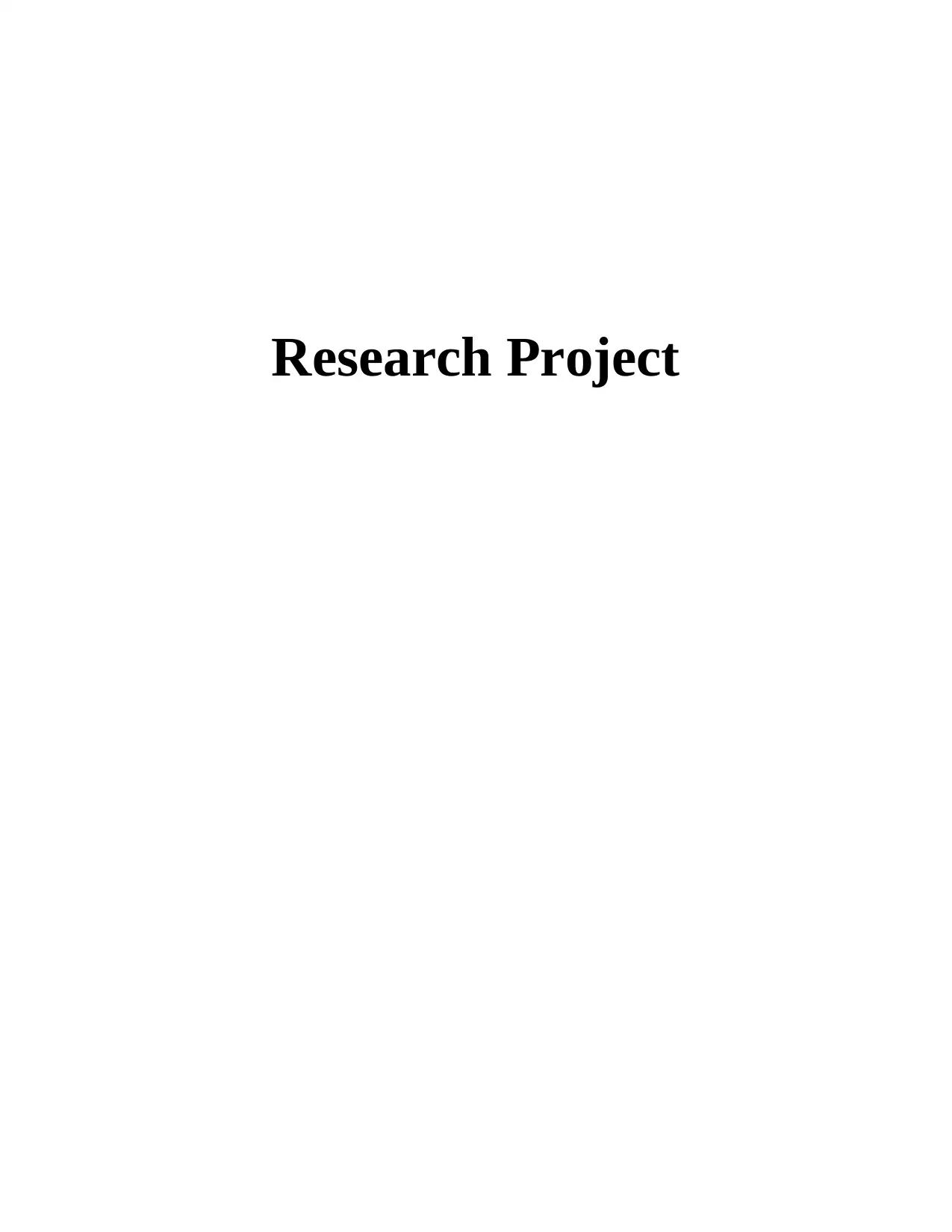
Research Project
Paraphrase This Document
Need a fresh take? Get an instant paraphrase of this document with our AI Paraphraser
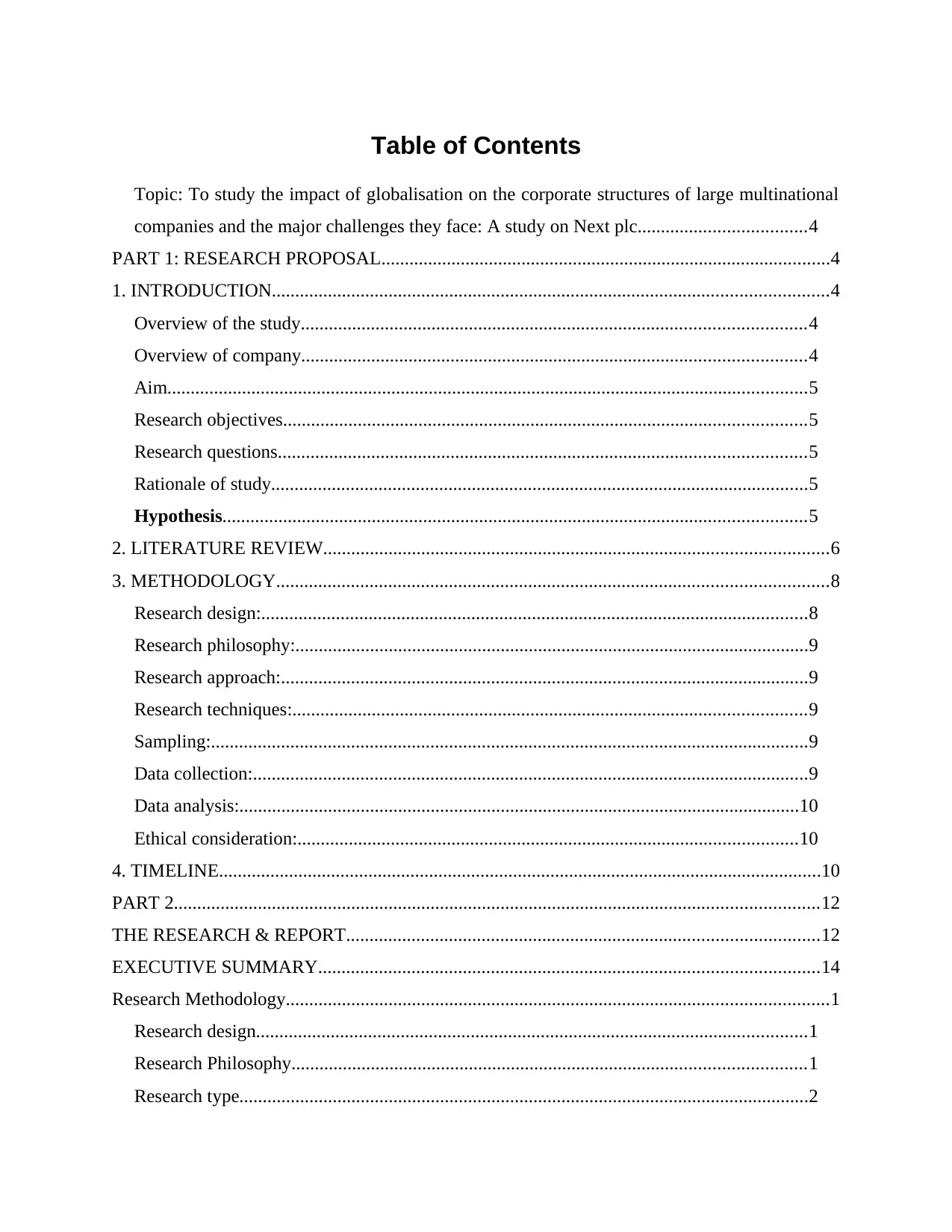
Table of Contents
Topic: To study the impact of globalisation on the corporate structures of large multinational
companies and the major challenges they face: A study on Next plc....................................4
PART 1: RESEARCH PROPOSAL................................................................................................4
1. INTRODUCTION.......................................................................................................................4
Overview of the study............................................................................................................4
Overview of company............................................................................................................4
Aim.........................................................................................................................................5
Research objectives................................................................................................................5
Research questions.................................................................................................................5
Rationale of study...................................................................................................................5
Hypothesis.............................................................................................................................5
2. LITERATURE REVIEW............................................................................................................6
3. METHODOLOGY......................................................................................................................8
Research design:.....................................................................................................................8
Research philosophy:..............................................................................................................9
Research approach:.................................................................................................................9
Research techniques:..............................................................................................................9
Sampling:................................................................................................................................9
Data collection:.......................................................................................................................9
Data analysis:........................................................................................................................10
Ethical consideration:...........................................................................................................10
4. TIMELINE.................................................................................................................................10
PART 2..........................................................................................................................................12
THE RESEARCH & REPORT.....................................................................................................12
EXECUTIVE SUMMARY...........................................................................................................14
Research Methodology....................................................................................................................1
Research design......................................................................................................................1
Research Philosophy..............................................................................................................1
Research type..........................................................................................................................2
Topic: To study the impact of globalisation on the corporate structures of large multinational
companies and the major challenges they face: A study on Next plc....................................4
PART 1: RESEARCH PROPOSAL................................................................................................4
1. INTRODUCTION.......................................................................................................................4
Overview of the study............................................................................................................4
Overview of company............................................................................................................4
Aim.........................................................................................................................................5
Research objectives................................................................................................................5
Research questions.................................................................................................................5
Rationale of study...................................................................................................................5
Hypothesis.............................................................................................................................5
2. LITERATURE REVIEW............................................................................................................6
3. METHODOLOGY......................................................................................................................8
Research design:.....................................................................................................................8
Research philosophy:..............................................................................................................9
Research approach:.................................................................................................................9
Research techniques:..............................................................................................................9
Sampling:................................................................................................................................9
Data collection:.......................................................................................................................9
Data analysis:........................................................................................................................10
Ethical consideration:...........................................................................................................10
4. TIMELINE.................................................................................................................................10
PART 2..........................................................................................................................................12
THE RESEARCH & REPORT.....................................................................................................12
EXECUTIVE SUMMARY...........................................................................................................14
Research Methodology....................................................................................................................1
Research design......................................................................................................................1
Research Philosophy..............................................................................................................1
Research type..........................................................................................................................2
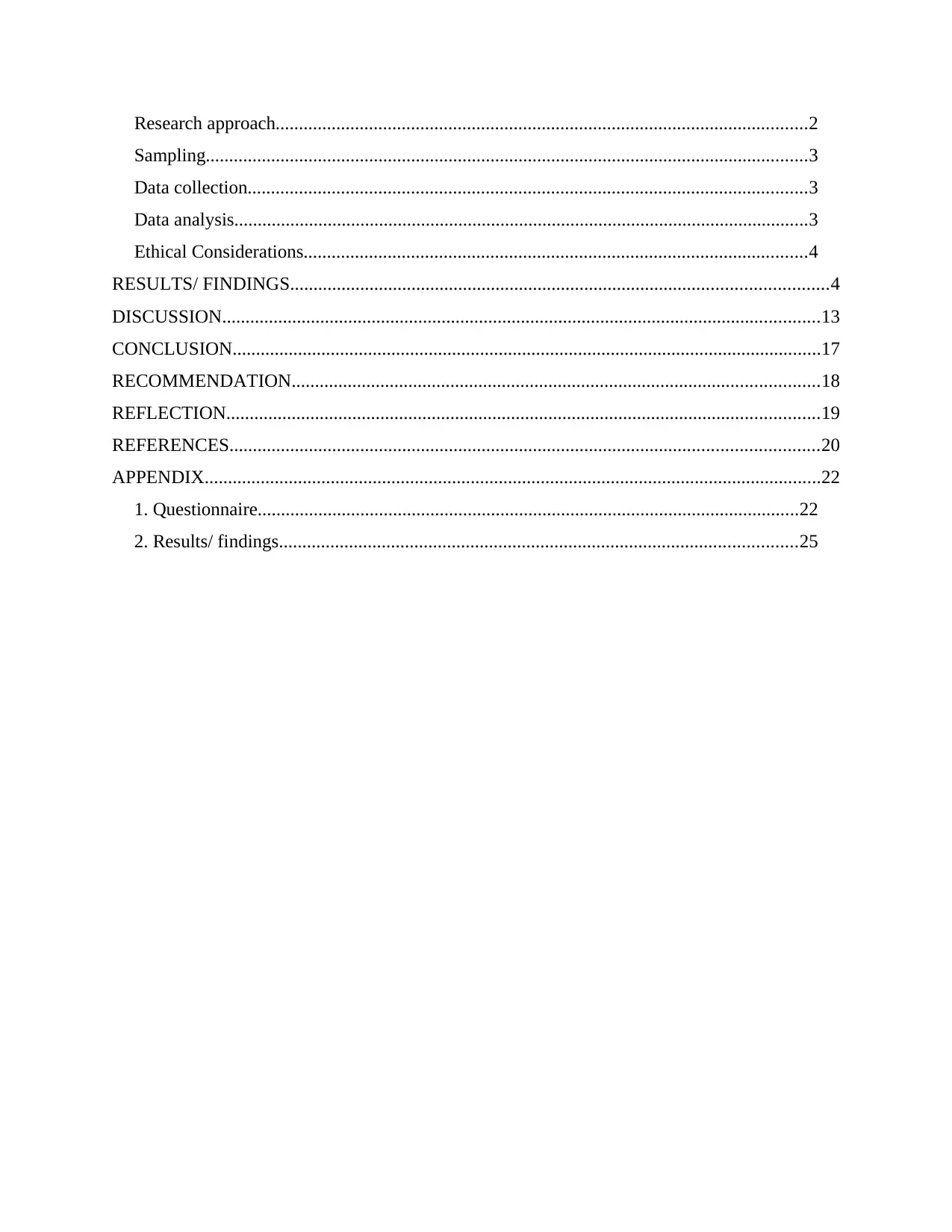
Research approach..................................................................................................................2
Sampling.................................................................................................................................3
Data collection........................................................................................................................3
Data analysis...........................................................................................................................3
Ethical Considerations............................................................................................................4
RESULTS/ FINDINGS...................................................................................................................4
DISCUSSION................................................................................................................................13
CONCLUSION..............................................................................................................................17
RECOMMENDATION.................................................................................................................18
REFLECTION...............................................................................................................................19
REFERENCES..............................................................................................................................20
APPENDIX....................................................................................................................................22
1. Questionnaire....................................................................................................................22
2. Results/ findings...............................................................................................................25
Sampling.................................................................................................................................3
Data collection........................................................................................................................3
Data analysis...........................................................................................................................3
Ethical Considerations............................................................................................................4
RESULTS/ FINDINGS...................................................................................................................4
DISCUSSION................................................................................................................................13
CONCLUSION..............................................................................................................................17
RECOMMENDATION.................................................................................................................18
REFLECTION...............................................................................................................................19
REFERENCES..............................................................................................................................20
APPENDIX....................................................................................................................................22
1. Questionnaire....................................................................................................................22
2. Results/ findings...............................................................................................................25
⊘ This is a preview!⊘
Do you want full access?
Subscribe today to unlock all pages.

Trusted by 1+ million students worldwide
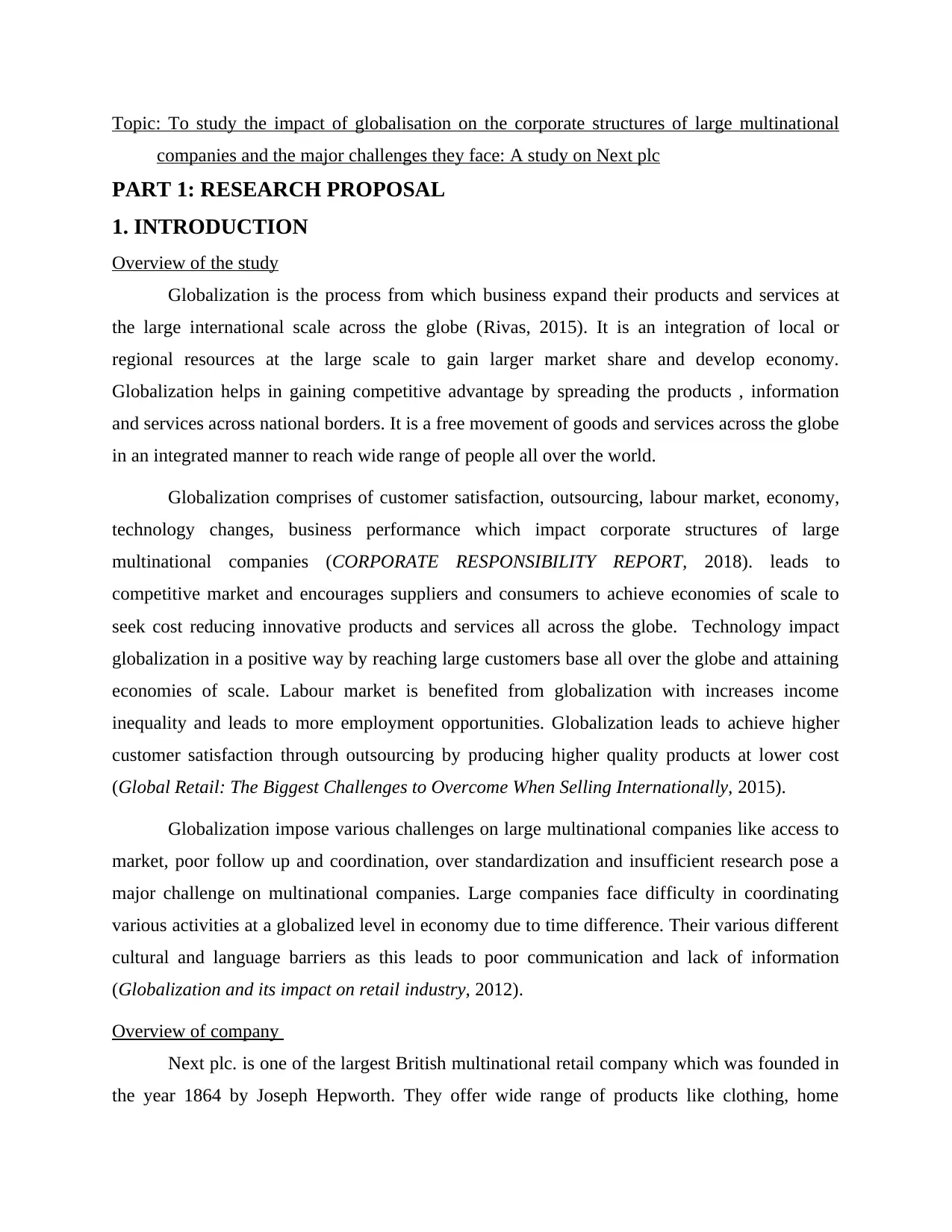
Topic: To study the impact of globalisation on the corporate structures of large multinational
companies and the major challenges they face: A study on Next plc
PART 1: RESEARCH PROPOSAL
1. INTRODUCTION
Overview of the study
Globalization is the process from which business expand their products and services at
the large international scale across the globe (Rivas, 2015). It is an integration of local or
regional resources at the large scale to gain larger market share and develop economy.
Globalization helps in gaining competitive advantage by spreading the products , information
and services across national borders. It is a free movement of goods and services across the globe
in an integrated manner to reach wide range of people all over the world.
Globalization comprises of customer satisfaction, outsourcing, labour market, economy,
technology changes, business performance which impact corporate structures of large
multinational companies (CORPORATE RESPONSIBILITY REPORT, 2018). leads to
competitive market and encourages suppliers and consumers to achieve economies of scale to
seek cost reducing innovative products and services all across the globe. Technology impact
globalization in a positive way by reaching large customers base all over the globe and attaining
economies of scale. Labour market is benefited from globalization with increases income
inequality and leads to more employment opportunities. Globalization leads to achieve higher
customer satisfaction through outsourcing by producing higher quality products at lower cost
(Global Retail: The Biggest Challenges to Overcome When Selling Internationally, 2015).
Globalization impose various challenges on large multinational companies like access to
market, poor follow up and coordination, over standardization and insufficient research pose a
major challenge on multinational companies. Large companies face difficulty in coordinating
various activities at a globalized level in economy due to time difference. Their various different
cultural and language barriers as this leads to poor communication and lack of information
(Globalization and its impact on retail industry, 2012).
Overview of company
Next plc. is one of the largest British multinational retail company which was founded in
the year 1864 by Joseph Hepworth. They offer wide range of products like clothing, home
companies and the major challenges they face: A study on Next plc
PART 1: RESEARCH PROPOSAL
1. INTRODUCTION
Overview of the study
Globalization is the process from which business expand their products and services at
the large international scale across the globe (Rivas, 2015). It is an integration of local or
regional resources at the large scale to gain larger market share and develop economy.
Globalization helps in gaining competitive advantage by spreading the products , information
and services across national borders. It is a free movement of goods and services across the globe
in an integrated manner to reach wide range of people all over the world.
Globalization comprises of customer satisfaction, outsourcing, labour market, economy,
technology changes, business performance which impact corporate structures of large
multinational companies (CORPORATE RESPONSIBILITY REPORT, 2018). leads to
competitive market and encourages suppliers and consumers to achieve economies of scale to
seek cost reducing innovative products and services all across the globe. Technology impact
globalization in a positive way by reaching large customers base all over the globe and attaining
economies of scale. Labour market is benefited from globalization with increases income
inequality and leads to more employment opportunities. Globalization leads to achieve higher
customer satisfaction through outsourcing by producing higher quality products at lower cost
(Global Retail: The Biggest Challenges to Overcome When Selling Internationally, 2015).
Globalization impose various challenges on large multinational companies like access to
market, poor follow up and coordination, over standardization and insufficient research pose a
major challenge on multinational companies. Large companies face difficulty in coordinating
various activities at a globalized level in economy due to time difference. Their various different
cultural and language barriers as this leads to poor communication and lack of information
(Globalization and its impact on retail industry, 2012).
Overview of company
Next plc. is one of the largest British multinational retail company which was founded in
the year 1864 by Joseph Hepworth. They offer wide range of products like clothing, home
Paraphrase This Document
Need a fresh take? Get an instant paraphrase of this document with our AI Paraphraser
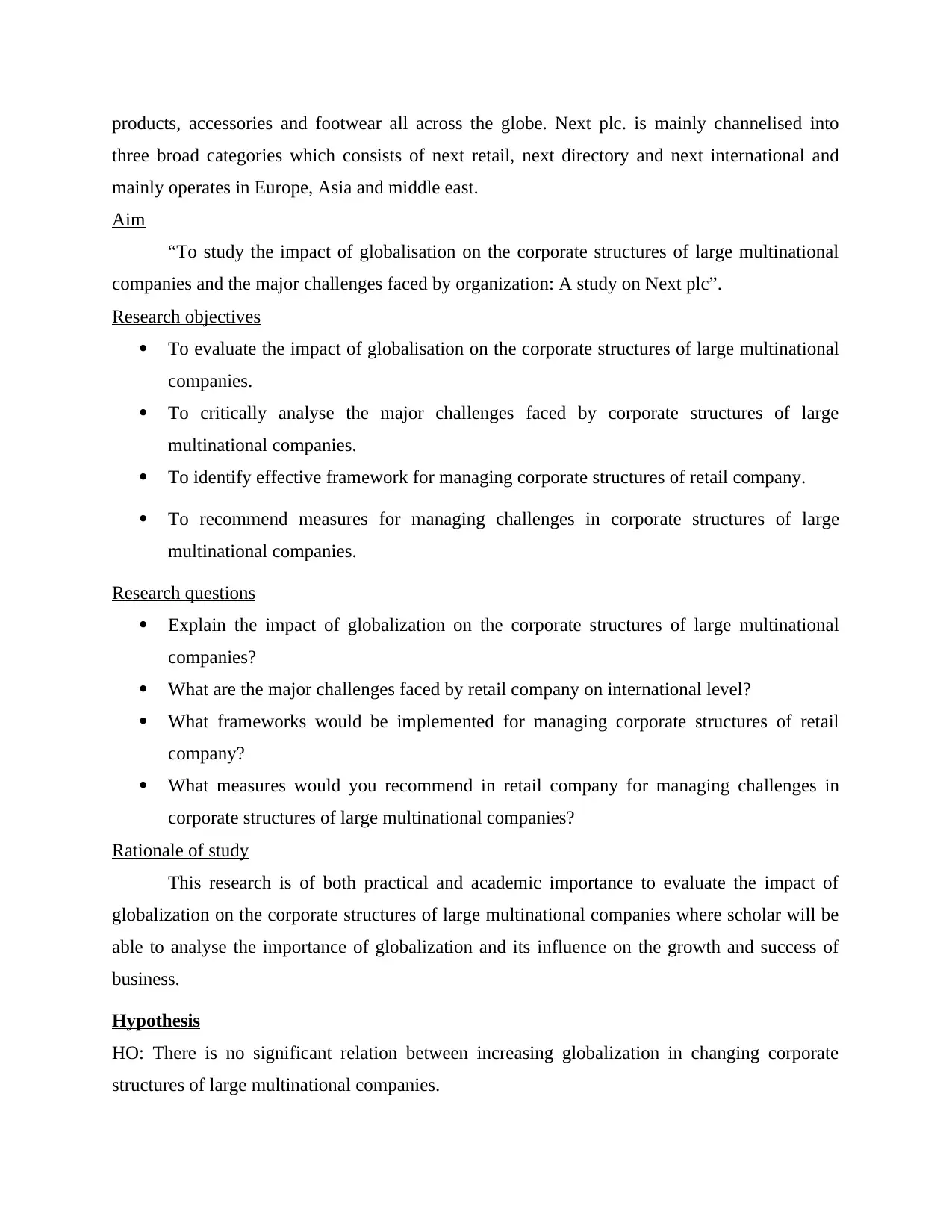
products, accessories and footwear all across the globe. Next plc. is mainly channelised into
three broad categories which consists of next retail, next directory and next international and
mainly operates in Europe, Asia and middle east.
Aim
“To study the impact of globalisation on the corporate structures of large multinational
companies and the major challenges faced by organization: A study on Next plc”.
Research objectives
To evaluate the impact of globalisation on the corporate structures of large multinational
companies.
To critically analyse the major challenges faced by corporate structures of large
multinational companies.
To identify effective framework for managing corporate structures of retail company.
To recommend measures for managing challenges in corporate structures of large
multinational companies.
Research questions
Explain the impact of globalization on the corporate structures of large multinational
companies?
What are the major challenges faced by retail company on international level?
What frameworks would be implemented for managing corporate structures of retail
company?
What measures would you recommend in retail company for managing challenges in
corporate structures of large multinational companies?
Rationale of study
This research is of both practical and academic importance to evaluate the impact of
globalization on the corporate structures of large multinational companies where scholar will be
able to analyse the importance of globalization and its influence on the growth and success of
business.
Hypothesis
HO: There is no significant relation between increasing globalization in changing corporate
structures of large multinational companies.
three broad categories which consists of next retail, next directory and next international and
mainly operates in Europe, Asia and middle east.
Aim
“To study the impact of globalisation on the corporate structures of large multinational
companies and the major challenges faced by organization: A study on Next plc”.
Research objectives
To evaluate the impact of globalisation on the corporate structures of large multinational
companies.
To critically analyse the major challenges faced by corporate structures of large
multinational companies.
To identify effective framework for managing corporate structures of retail company.
To recommend measures for managing challenges in corporate structures of large
multinational companies.
Research questions
Explain the impact of globalization on the corporate structures of large multinational
companies?
What are the major challenges faced by retail company on international level?
What frameworks would be implemented for managing corporate structures of retail
company?
What measures would you recommend in retail company for managing challenges in
corporate structures of large multinational companies?
Rationale of study
This research is of both practical and academic importance to evaluate the impact of
globalization on the corporate structures of large multinational companies where scholar will be
able to analyse the importance of globalization and its influence on the growth and success of
business.
Hypothesis
HO: There is no significant relation between increasing globalization in changing corporate
structures of large multinational companies.
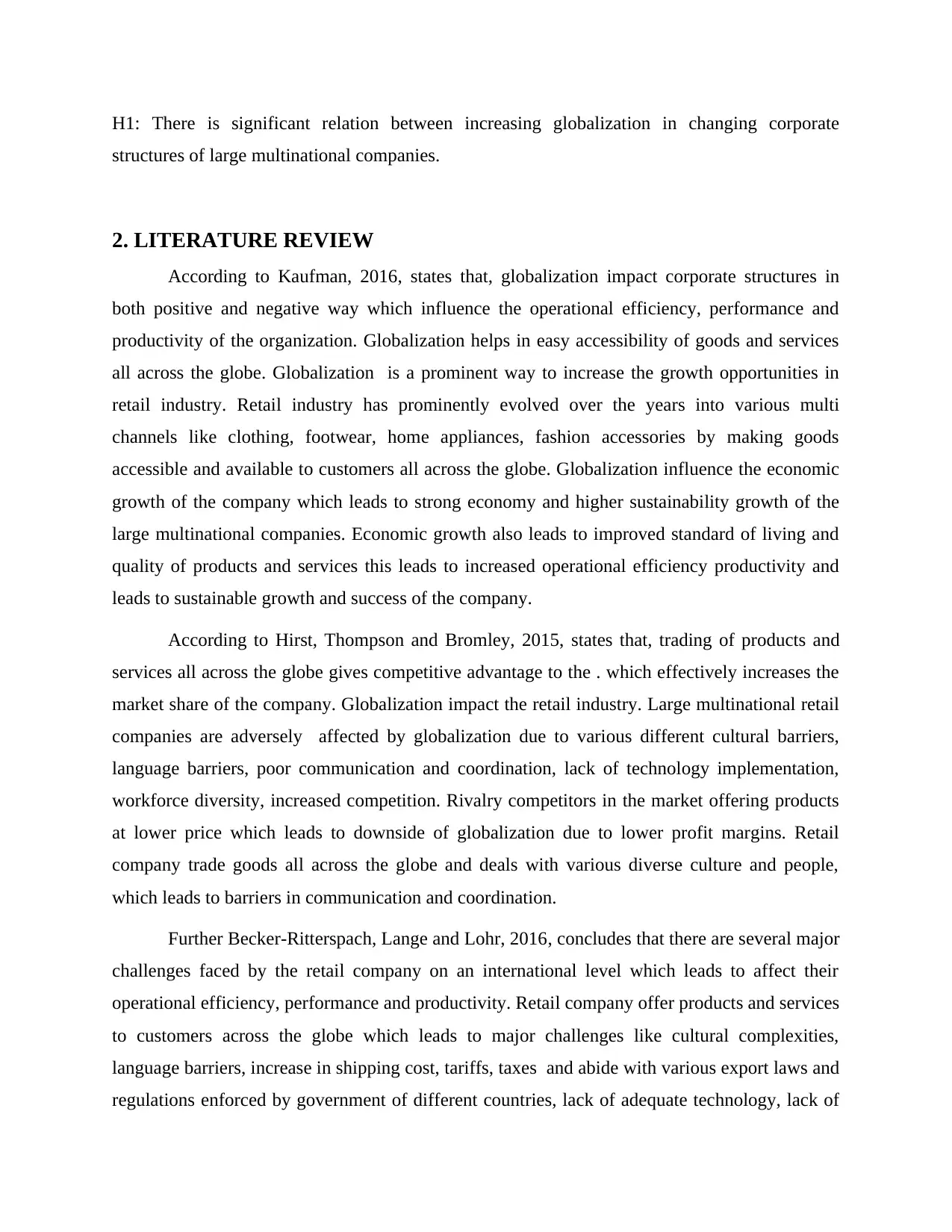
H1: There is significant relation between increasing globalization in changing corporate
structures of large multinational companies.
2. LITERATURE REVIEW
According to Kaufman, 2016, states that, globalization impact corporate structures in
both positive and negative way which influence the operational efficiency, performance and
productivity of the organization. Globalization helps in easy accessibility of goods and services
all across the globe. Globalization is a prominent way to increase the growth opportunities in
retail industry. Retail industry has prominently evolved over the years into various multi
channels like clothing, footwear, home appliances, fashion accessories by making goods
accessible and available to customers all across the globe. Globalization influence the economic
growth of the company which leads to strong economy and higher sustainability growth of the
large multinational companies. Economic growth also leads to improved standard of living and
quality of products and services this leads to increased operational efficiency productivity and
leads to sustainable growth and success of the company.
According to Hirst, Thompson and Bromley, 2015, states that, trading of products and
services all across the globe gives competitive advantage to the . which effectively increases the
market share of the company. Globalization impact the retail industry. Large multinational retail
companies are adversely affected by globalization due to various different cultural barriers,
language barriers, poor communication and coordination, lack of technology implementation,
workforce diversity, increased competition. Rivalry competitors in the market offering products
at lower price which leads to downside of globalization due to lower profit margins. Retail
company trade goods all across the globe and deals with various diverse culture and people,
which leads to barriers in communication and coordination.
Further Becker-Ritterspach, Lange and Lohr, 2016, concludes that there are several major
challenges faced by the retail company on an international level which leads to affect their
operational efficiency, performance and productivity. Retail company offer products and services
to customers across the globe which leads to major challenges like cultural complexities,
language barriers, increase in shipping cost, tariffs, taxes and abide with various export laws and
regulations enforced by government of different countries, lack of adequate technology, lack of
structures of large multinational companies.
2. LITERATURE REVIEW
According to Kaufman, 2016, states that, globalization impact corporate structures in
both positive and negative way which influence the operational efficiency, performance and
productivity of the organization. Globalization helps in easy accessibility of goods and services
all across the globe. Globalization is a prominent way to increase the growth opportunities in
retail industry. Retail industry has prominently evolved over the years into various multi
channels like clothing, footwear, home appliances, fashion accessories by making goods
accessible and available to customers all across the globe. Globalization influence the economic
growth of the company which leads to strong economy and higher sustainability growth of the
large multinational companies. Economic growth also leads to improved standard of living and
quality of products and services this leads to increased operational efficiency productivity and
leads to sustainable growth and success of the company.
According to Hirst, Thompson and Bromley, 2015, states that, trading of products and
services all across the globe gives competitive advantage to the . which effectively increases the
market share of the company. Globalization impact the retail industry. Large multinational retail
companies are adversely affected by globalization due to various different cultural barriers,
language barriers, poor communication and coordination, lack of technology implementation,
workforce diversity, increased competition. Rivalry competitors in the market offering products
at lower price which leads to downside of globalization due to lower profit margins. Retail
company trade goods all across the globe and deals with various diverse culture and people,
which leads to barriers in communication and coordination.
Further Becker-Ritterspach, Lange and Lohr, 2016, concludes that there are several major
challenges faced by the retail company on an international level which leads to affect their
operational efficiency, performance and productivity. Retail company offer products and services
to customers across the globe which leads to major challenges like cultural complexities,
language barriers, increase in shipping cost, tariffs, taxes and abide with various export laws and
regulations enforced by government of different countries, lack of adequate technology, lack of
⊘ This is a preview!⊘
Do you want full access?
Subscribe today to unlock all pages.

Trusted by 1+ million students worldwide
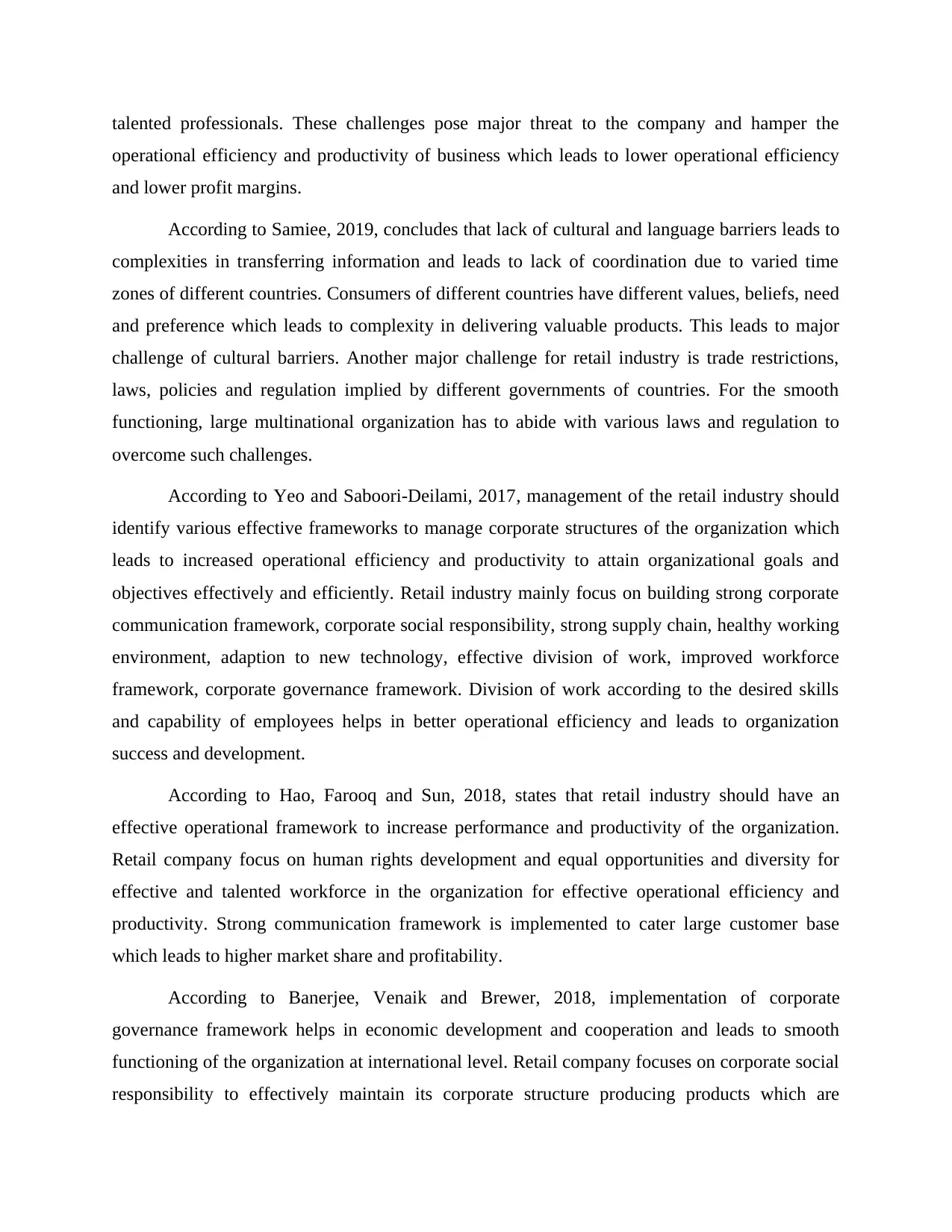
talented professionals. These challenges pose major threat to the company and hamper the
operational efficiency and productivity of business which leads to lower operational efficiency
and lower profit margins.
According to Samiee, 2019, concludes that lack of cultural and language barriers leads to
complexities in transferring information and leads to lack of coordination due to varied time
zones of different countries. Consumers of different countries have different values, beliefs, need
and preference which leads to complexity in delivering valuable products. This leads to major
challenge of cultural barriers. Another major challenge for retail industry is trade restrictions,
laws, policies and regulation implied by different governments of countries. For the smooth
functioning, large multinational organization has to abide with various laws and regulation to
overcome such challenges.
According to Yeo and Saboori-Deilami, 2017, management of the retail industry should
identify various effective frameworks to manage corporate structures of the organization which
leads to increased operational efficiency and productivity to attain organizational goals and
objectives effectively and efficiently. Retail industry mainly focus on building strong corporate
communication framework, corporate social responsibility, strong supply chain, healthy working
environment, adaption to new technology, effective division of work, improved workforce
framework, corporate governance framework. Division of work according to the desired skills
and capability of employees helps in better operational efficiency and leads to organization
success and development.
According to Hao, Farooq and Sun, 2018, states that retail industry should have an
effective operational framework to increase performance and productivity of the organization.
Retail company focus on human rights development and equal opportunities and diversity for
effective and talented workforce in the organization for effective operational efficiency and
productivity. Strong communication framework is implemented to cater large customer base
which leads to higher market share and profitability.
According to Banerjee, Venaik and Brewer, 2018, implementation of corporate
governance framework helps in economic development and cooperation and leads to smooth
functioning of the organization at international level. Retail company focuses on corporate social
responsibility to effectively maintain its corporate structure producing products which are
operational efficiency and productivity of business which leads to lower operational efficiency
and lower profit margins.
According to Samiee, 2019, concludes that lack of cultural and language barriers leads to
complexities in transferring information and leads to lack of coordination due to varied time
zones of different countries. Consumers of different countries have different values, beliefs, need
and preference which leads to complexity in delivering valuable products. This leads to major
challenge of cultural barriers. Another major challenge for retail industry is trade restrictions,
laws, policies and regulation implied by different governments of countries. For the smooth
functioning, large multinational organization has to abide with various laws and regulation to
overcome such challenges.
According to Yeo and Saboori-Deilami, 2017, management of the retail industry should
identify various effective frameworks to manage corporate structures of the organization which
leads to increased operational efficiency and productivity to attain organizational goals and
objectives effectively and efficiently. Retail industry mainly focus on building strong corporate
communication framework, corporate social responsibility, strong supply chain, healthy working
environment, adaption to new technology, effective division of work, improved workforce
framework, corporate governance framework. Division of work according to the desired skills
and capability of employees helps in better operational efficiency and leads to organization
success and development.
According to Hao, Farooq and Sun, 2018, states that retail industry should have an
effective operational framework to increase performance and productivity of the organization.
Retail company focus on human rights development and equal opportunities and diversity for
effective and talented workforce in the organization for effective operational efficiency and
productivity. Strong communication framework is implemented to cater large customer base
which leads to higher market share and profitability.
According to Banerjee, Venaik and Brewer, 2018, implementation of corporate
governance framework helps in economic development and cooperation and leads to smooth
functioning of the organization at international level. Retail company focuses on corporate social
responsibility to effectively maintain its corporate structure producing products which are
Paraphrase This Document
Need a fresh take? Get an instant paraphrase of this document with our AI Paraphraser
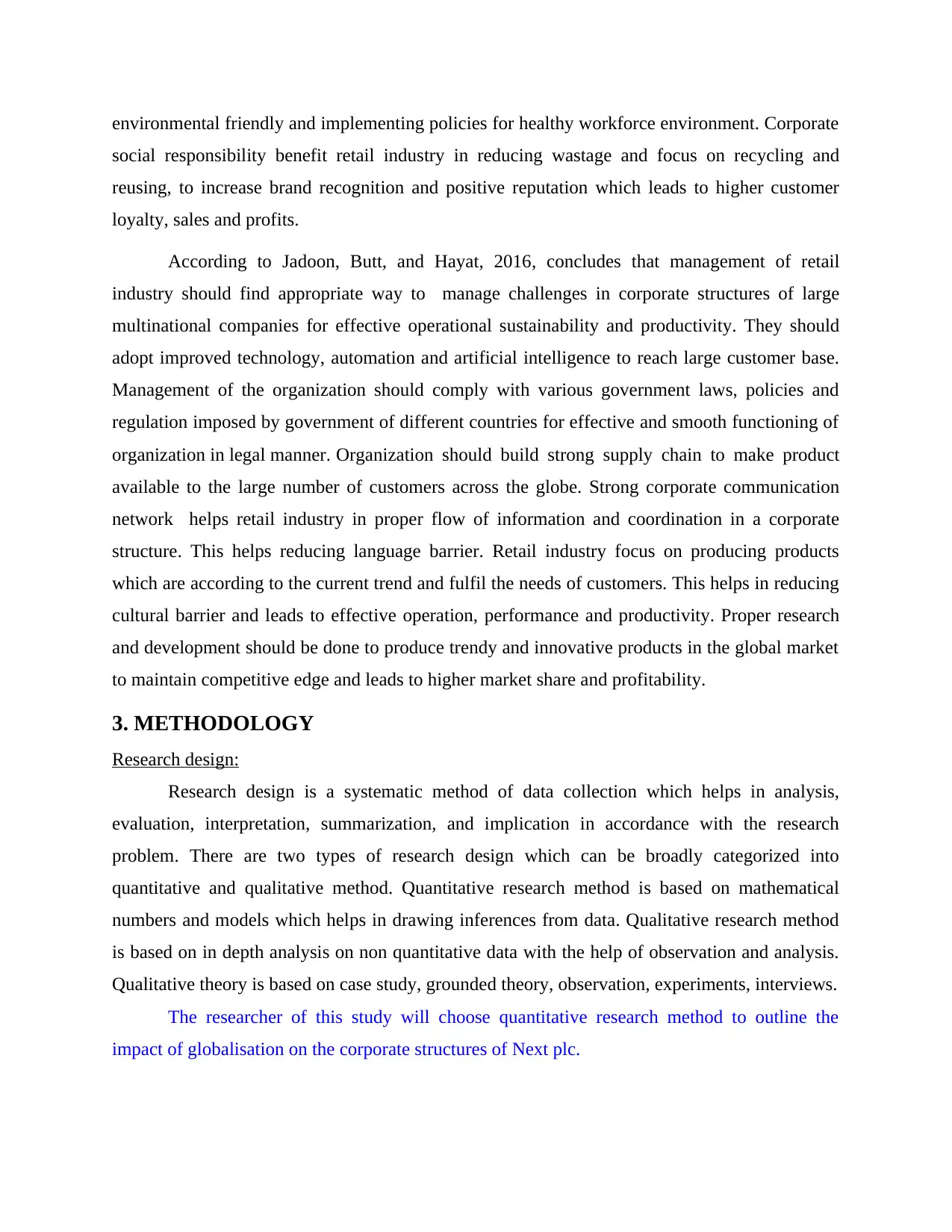
environmental friendly and implementing policies for healthy workforce environment. Corporate
social responsibility benefit retail industry in reducing wastage and focus on recycling and
reusing, to increase brand recognition and positive reputation which leads to higher customer
loyalty, sales and profits.
According to Jadoon, Butt, and Hayat, 2016, concludes that management of retail
industry should find appropriate way to manage challenges in corporate structures of large
multinational companies for effective operational sustainability and productivity. They should
adopt improved technology, automation and artificial intelligence to reach large customer base.
Management of the organization should comply with various government laws, policies and
regulation imposed by government of different countries for effective and smooth functioning of
organization in legal manner. Organization should build strong supply chain to make product
available to the large number of customers across the globe. Strong corporate communication
network helps retail industry in proper flow of information and coordination in a corporate
structure. This helps reducing language barrier. Retail industry focus on producing products
which are according to the current trend and fulfil the needs of customers. This helps in reducing
cultural barrier and leads to effective operation, performance and productivity. Proper research
and development should be done to produce trendy and innovative products in the global market
to maintain competitive edge and leads to higher market share and profitability.
3. METHODOLOGY
Research design:
Research design is a systematic method of data collection which helps in analysis,
evaluation, interpretation, summarization, and implication in accordance with the research
problem. There are two types of research design which can be broadly categorized into
quantitative and qualitative method. Quantitative research method is based on mathematical
numbers and models which helps in drawing inferences from data. Qualitative research method
is based on in depth analysis on non quantitative data with the help of observation and analysis.
Qualitative theory is based on case study, grounded theory, observation, experiments, interviews.
The researcher of this study will choose quantitative research method to outline the
impact of globalisation on the corporate structures of Next plc.
social responsibility benefit retail industry in reducing wastage and focus on recycling and
reusing, to increase brand recognition and positive reputation which leads to higher customer
loyalty, sales and profits.
According to Jadoon, Butt, and Hayat, 2016, concludes that management of retail
industry should find appropriate way to manage challenges in corporate structures of large
multinational companies for effective operational sustainability and productivity. They should
adopt improved technology, automation and artificial intelligence to reach large customer base.
Management of the organization should comply with various government laws, policies and
regulation imposed by government of different countries for effective and smooth functioning of
organization in legal manner. Organization should build strong supply chain to make product
available to the large number of customers across the globe. Strong corporate communication
network helps retail industry in proper flow of information and coordination in a corporate
structure. This helps reducing language barrier. Retail industry focus on producing products
which are according to the current trend and fulfil the needs of customers. This helps in reducing
cultural barrier and leads to effective operation, performance and productivity. Proper research
and development should be done to produce trendy and innovative products in the global market
to maintain competitive edge and leads to higher market share and profitability.
3. METHODOLOGY
Research design:
Research design is a systematic method of data collection which helps in analysis,
evaluation, interpretation, summarization, and implication in accordance with the research
problem. There are two types of research design which can be broadly categorized into
quantitative and qualitative method. Quantitative research method is based on mathematical
numbers and models which helps in drawing inferences from data. Qualitative research method
is based on in depth analysis on non quantitative data with the help of observation and analysis.
Qualitative theory is based on case study, grounded theory, observation, experiments, interviews.
The researcher of this study will choose quantitative research method to outline the
impact of globalisation on the corporate structures of Next plc.
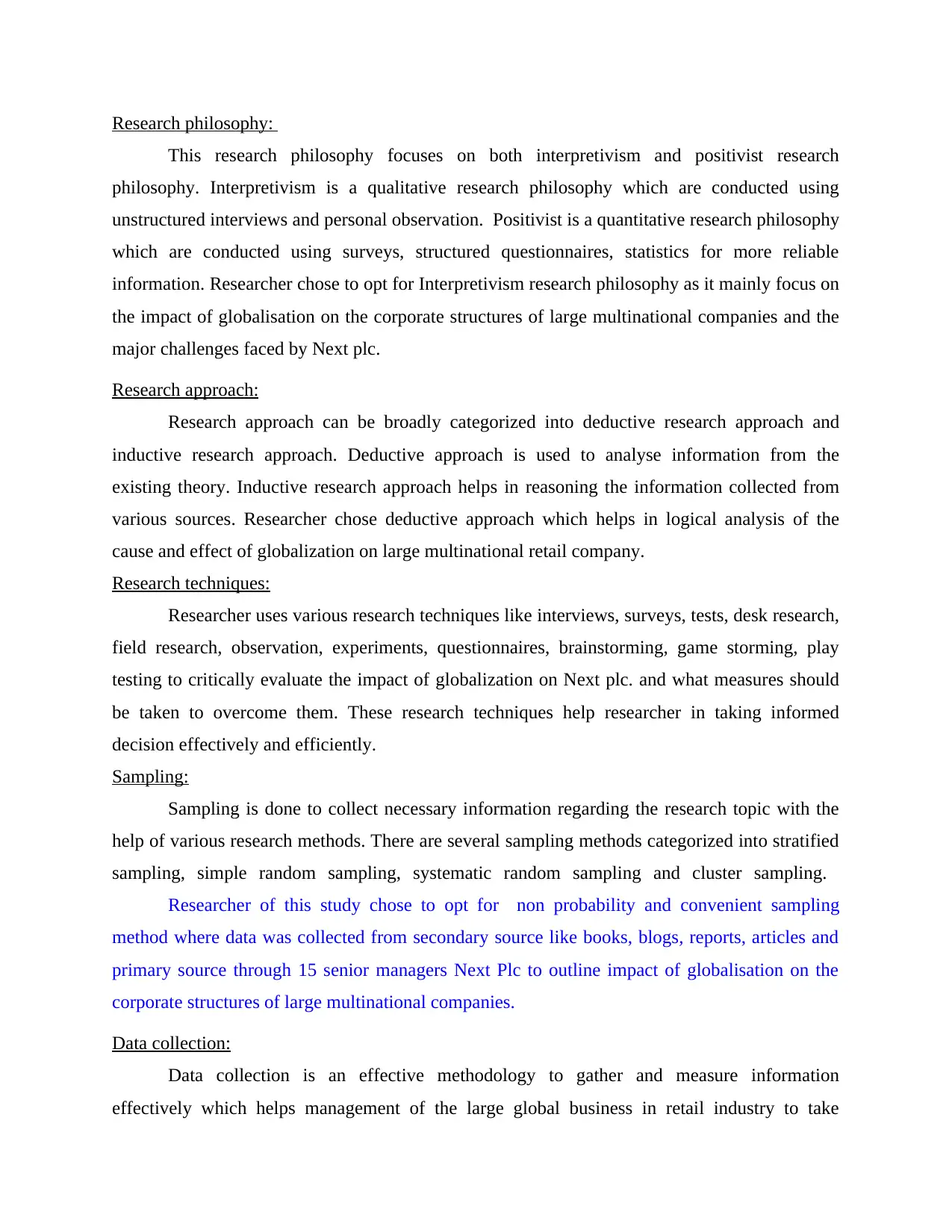
Research philosophy:
This research philosophy focuses on both interpretivism and positivist research
philosophy. Interpretivism is a qualitative research philosophy which are conducted using
unstructured interviews and personal observation. Positivist is a quantitative research philosophy
which are conducted using surveys, structured questionnaires, statistics for more reliable
information. Researcher chose to opt for Interpretivism research philosophy as it mainly focus on
the impact of globalisation on the corporate structures of large multinational companies and the
major challenges faced by Next plc.
Research approach:
Research approach can be broadly categorized into deductive research approach and
inductive research approach. Deductive approach is used to analyse information from the
existing theory. Inductive research approach helps in reasoning the information collected from
various sources. Researcher chose deductive approach which helps in logical analysis of the
cause and effect of globalization on large multinational retail company.
Research techniques:
Researcher uses various research techniques like interviews, surveys, tests, desk research,
field research, observation, experiments, questionnaires, brainstorming, game storming, play
testing to critically evaluate the impact of globalization on Next plc. and what measures should
be taken to overcome them. These research techniques help researcher in taking informed
decision effectively and efficiently.
Sampling:
Sampling is done to collect necessary information regarding the research topic with the
help of various research methods. There are several sampling methods categorized into stratified
sampling, simple random sampling, systematic random sampling and cluster sampling.
Researcher of this study chose to opt for non probability and convenient sampling
method where data was collected from secondary source like books, blogs, reports, articles and
primary source through 15 senior managers Next Plc to outline impact of globalisation on the
corporate structures of large multinational companies.
Data collection:
Data collection is an effective methodology to gather and measure information
effectively which helps management of the large global business in retail industry to take
This research philosophy focuses on both interpretivism and positivist research
philosophy. Interpretivism is a qualitative research philosophy which are conducted using
unstructured interviews and personal observation. Positivist is a quantitative research philosophy
which are conducted using surveys, structured questionnaires, statistics for more reliable
information. Researcher chose to opt for Interpretivism research philosophy as it mainly focus on
the impact of globalisation on the corporate structures of large multinational companies and the
major challenges faced by Next plc.
Research approach:
Research approach can be broadly categorized into deductive research approach and
inductive research approach. Deductive approach is used to analyse information from the
existing theory. Inductive research approach helps in reasoning the information collected from
various sources. Researcher chose deductive approach which helps in logical analysis of the
cause and effect of globalization on large multinational retail company.
Research techniques:
Researcher uses various research techniques like interviews, surveys, tests, desk research,
field research, observation, experiments, questionnaires, brainstorming, game storming, play
testing to critically evaluate the impact of globalization on Next plc. and what measures should
be taken to overcome them. These research techniques help researcher in taking informed
decision effectively and efficiently.
Sampling:
Sampling is done to collect necessary information regarding the research topic with the
help of various research methods. There are several sampling methods categorized into stratified
sampling, simple random sampling, systematic random sampling and cluster sampling.
Researcher of this study chose to opt for non probability and convenient sampling
method where data was collected from secondary source like books, blogs, reports, articles and
primary source through 15 senior managers Next Plc to outline impact of globalisation on the
corporate structures of large multinational companies.
Data collection:
Data collection is an effective methodology to gather and measure information
effectively which helps management of the large global business in retail industry to take
⊘ This is a preview!⊘
Do you want full access?
Subscribe today to unlock all pages.

Trusted by 1+ million students worldwide
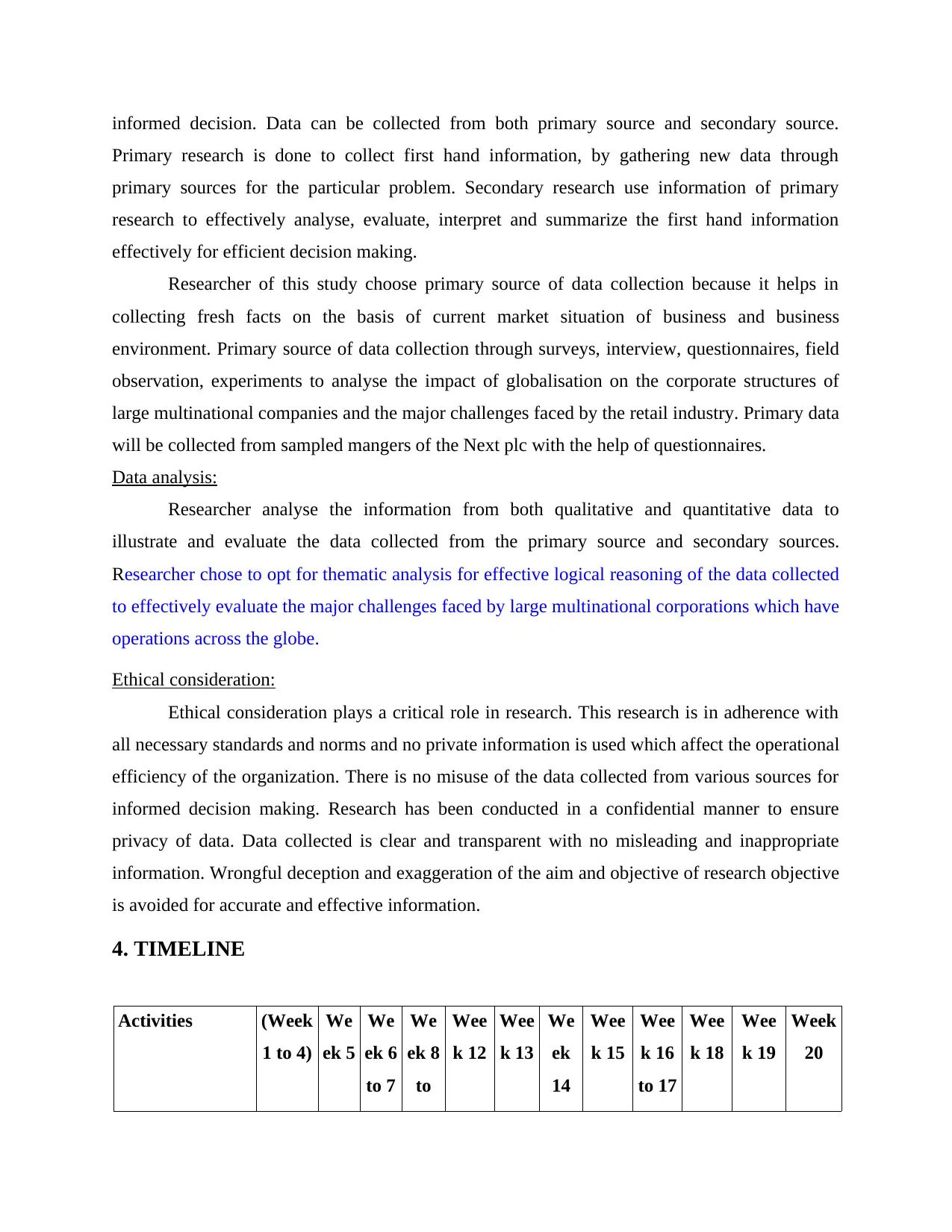
informed decision. Data can be collected from both primary source and secondary source.
Primary research is done to collect first hand information, by gathering new data through
primary sources for the particular problem. Secondary research use information of primary
research to effectively analyse, evaluate, interpret and summarize the first hand information
effectively for efficient decision making.
Researcher of this study choose primary source of data collection because it helps in
collecting fresh facts on the basis of current market situation of business and business
environment. Primary source of data collection through surveys, interview, questionnaires, field
observation, experiments to analyse the impact of globalisation on the corporate structures of
large multinational companies and the major challenges faced by the retail industry. Primary data
will be collected from sampled mangers of the Next plc with the help of questionnaires.
Data analysis:
Researcher analyse the information from both qualitative and quantitative data to
illustrate and evaluate the data collected from the primary source and secondary sources.
Researcher chose to opt for thematic analysis for effective logical reasoning of the data collected
to effectively evaluate the major challenges faced by large multinational corporations which have
operations across the globe.
Ethical consideration:
Ethical consideration plays a critical role in research. This research is in adherence with
all necessary standards and norms and no private information is used which affect the operational
efficiency of the organization. There is no misuse of the data collected from various sources for
informed decision making. Research has been conducted in a confidential manner to ensure
privacy of data. Data collected is clear and transparent with no misleading and inappropriate
information. Wrongful deception and exaggeration of the aim and objective of research objective
is avoided for accurate and effective information.
4. TIMELINE
Activities (Week
1 to 4)
We
ek 5
We
ek 6
to 7
We
ek 8
to
Wee
k 12
Wee
k 13
We
ek
14
Wee
k 15
Wee
k 16
to 17
Wee
k 18
Wee
k 19
Week
20
Primary research is done to collect first hand information, by gathering new data through
primary sources for the particular problem. Secondary research use information of primary
research to effectively analyse, evaluate, interpret and summarize the first hand information
effectively for efficient decision making.
Researcher of this study choose primary source of data collection because it helps in
collecting fresh facts on the basis of current market situation of business and business
environment. Primary source of data collection through surveys, interview, questionnaires, field
observation, experiments to analyse the impact of globalisation on the corporate structures of
large multinational companies and the major challenges faced by the retail industry. Primary data
will be collected from sampled mangers of the Next plc with the help of questionnaires.
Data analysis:
Researcher analyse the information from both qualitative and quantitative data to
illustrate and evaluate the data collected from the primary source and secondary sources.
Researcher chose to opt for thematic analysis for effective logical reasoning of the data collected
to effectively evaluate the major challenges faced by large multinational corporations which have
operations across the globe.
Ethical consideration:
Ethical consideration plays a critical role in research. This research is in adherence with
all necessary standards and norms and no private information is used which affect the operational
efficiency of the organization. There is no misuse of the data collected from various sources for
informed decision making. Research has been conducted in a confidential manner to ensure
privacy of data. Data collected is clear and transparent with no misleading and inappropriate
information. Wrongful deception and exaggeration of the aim and objective of research objective
is avoided for accurate and effective information.
4. TIMELINE
Activities (Week
1 to 4)
We
ek 5
We
ek 6
to 7
We
ek 8
to
Wee
k 12
Wee
k 13
We
ek
14
Wee
k 15
Wee
k 16
to 17
Wee
k 18
Wee
k 19
Week
20
Paraphrase This Document
Need a fresh take? Get an instant paraphrase of this document with our AI Paraphraser
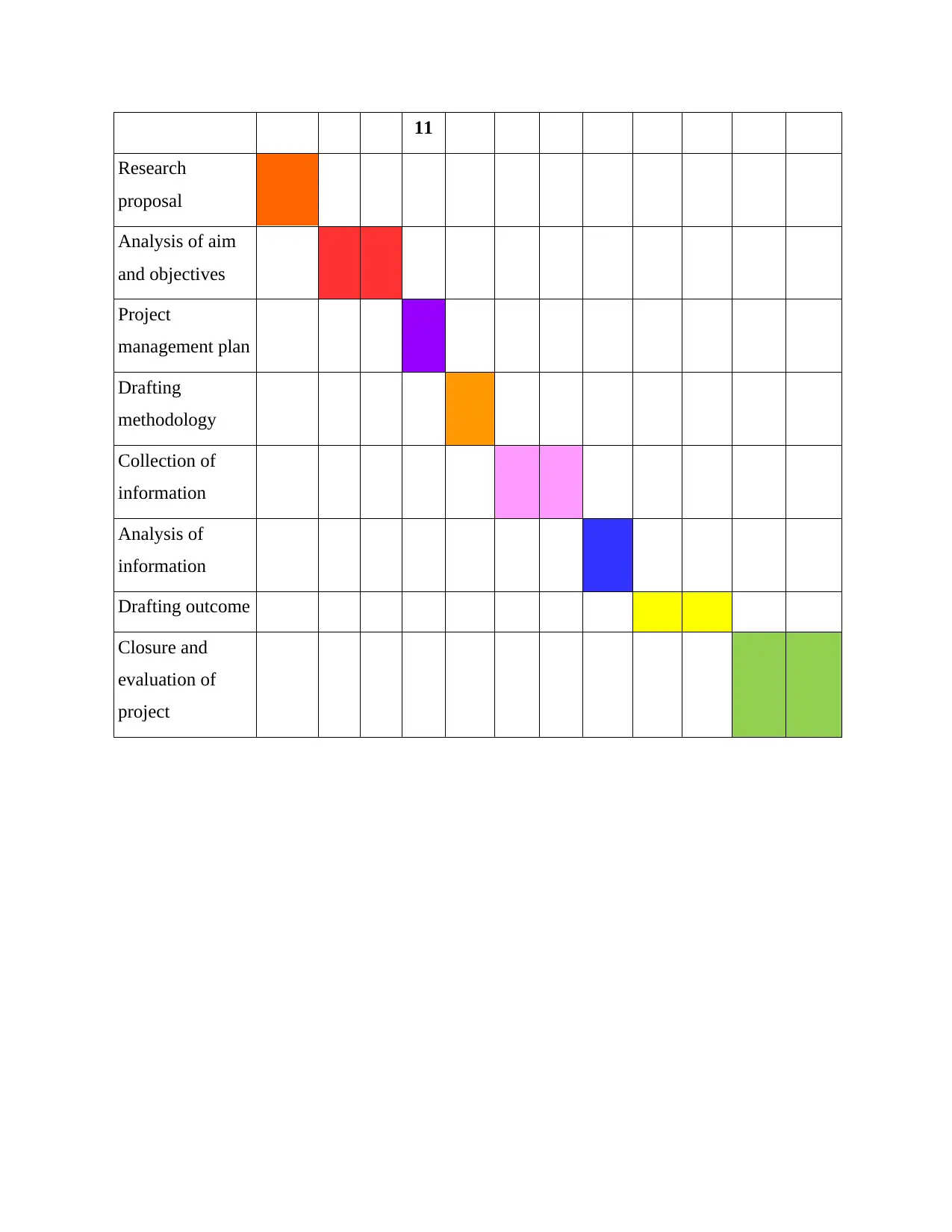
11
Research
proposal
Analysis of aim
and objectives
Project
management plan
Drafting
methodology
Collection of
information
Analysis of
information
Drafting outcome
Closure and
evaluation of
project
Research
proposal
Analysis of aim
and objectives
Project
management plan
Drafting
methodology
Collection of
information
Analysis of
information
Drafting outcome
Closure and
evaluation of
project
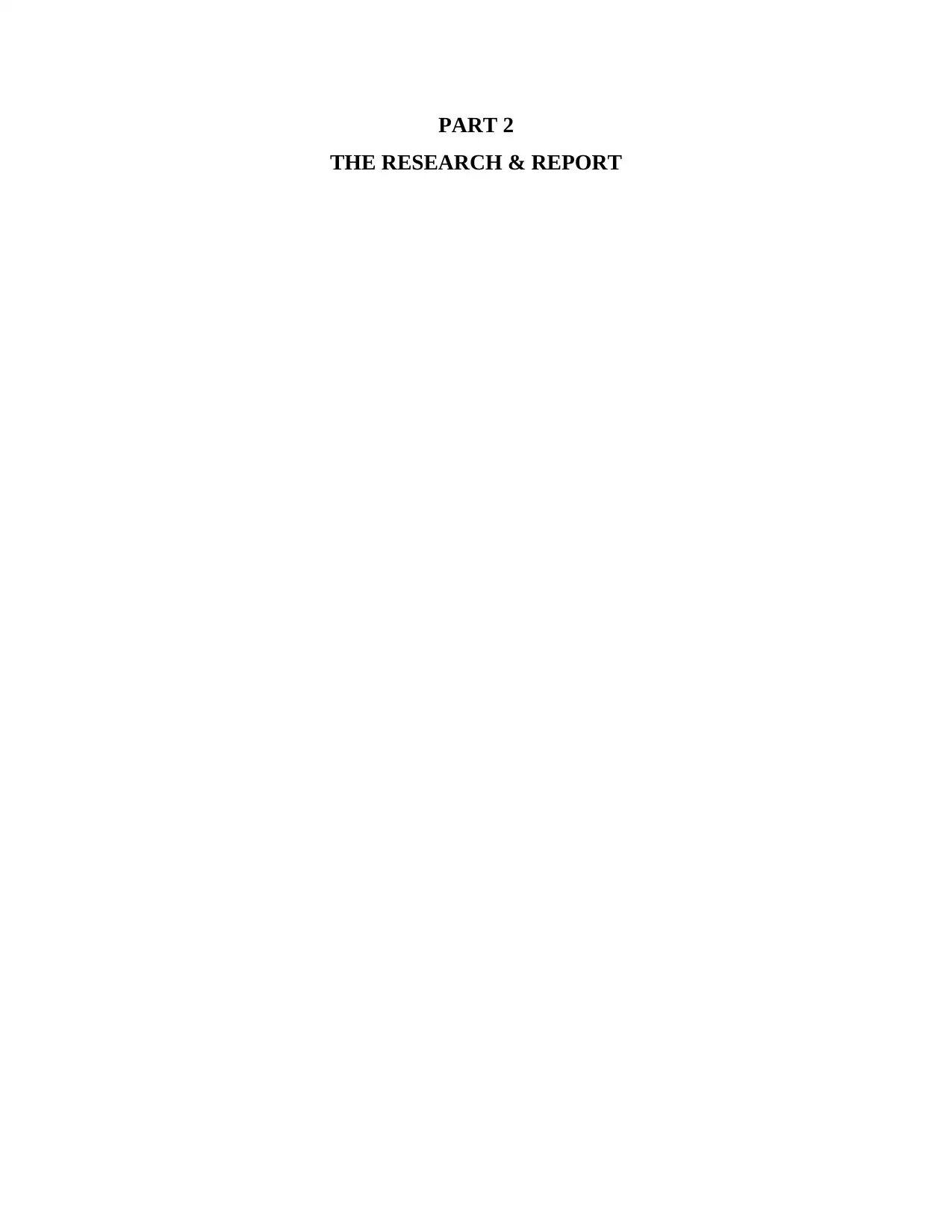
PART 2
THE RESEARCH & REPORT
THE RESEARCH & REPORT
⊘ This is a preview!⊘
Do you want full access?
Subscribe today to unlock all pages.

Trusted by 1+ million students worldwide
1 out of 43
Related Documents
Your All-in-One AI-Powered Toolkit for Academic Success.
+13062052269
info@desklib.com
Available 24*7 on WhatsApp / Email
![[object Object]](/_next/static/media/star-bottom.7253800d.svg)
Unlock your academic potential
Copyright © 2020–2026 A2Z Services. All Rights Reserved. Developed and managed by ZUCOL.





